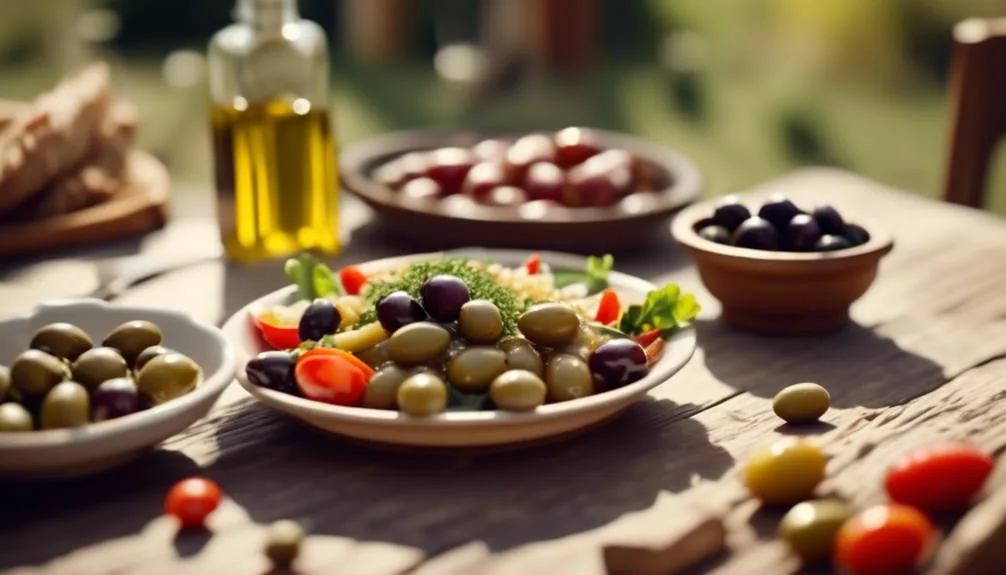The Mediterranean diet is known for its delicious and healthy foods, with olive oil and olives playing a central role. But have you ever thought about the importance of the olive tree in this way of eating?
Olive trees are essential for the Mediterranean diet, providing not only tasty fruit but also products that contribute to a balanced and healthy lifestyle. Let's take a closer look at how these trees fit into the iconic Mediterranean diet.
Key Takeaways
- Olive oil and olives are rich in monounsaturated fats that reduce the risk of heart disease.
- Olive oil and olives contain antioxidants that protect against chronic diseases.
- Olives provide monounsaturated fats and antioxidants that lower the risk of heart disease and reduce inflammation.
- Olive oil is a versatile and heart-healthy cooking staple in Mediterranean cuisine.
Health Benefits of Olive Oil
If you're looking for a simple way to boost your overall health, incorporating olive oil into your diet can provide a multitude of benefits.
The cardiovascular health benefits of olive oil are well-documented. It's rich in monounsaturated fats that can help reduce the risk of heart disease by lowering bad cholesterol levels and maintaining good cholesterol levels.
Additionally, olive oil's antioxidant properties help to protect the body from oxidative stress, reducing the risk of chronic diseases.
Beyond its health benefits, olive oil has versatile culinary uses, adding a rich and flavorful touch to salads, pastas, and more.
It also has beauty remedies, serving as a natural moisturizer for the skin and hair, leaving them nourished and radiant.
Incorporating olive oil into your lifestyle can yield numerous health and wellness advantages.
Olive Oil in Traditional Recipes
When exploring traditional recipes, incorporating olive oil adds a rich and distinctive flavor that enhances the authentic Mediterranean taste of the dishes. Olive oil has been a staple in Mediterranean cuisine for centuries, and its versatility in cooking is unparalleled. Here are some traditional recipes where olive oil plays a central role:
- Greek Salad: A refreshing mix of tomatoes, cucumbers, onions, and feta cheese drizzled with extra virgin olive oil.
- Italian Bruschetta: Slices of toasted bread topped with a mixture of tomatoes, garlic, basil, and a generous drizzle of olive oil.
- Spanish Paella: This iconic dish uses olive oil as the base for sautéing onions, garlic, and peppers before adding rice and other ingredients.
- Moroccan Tagine: Olive oil is used to brown meat and create a flavorful base for the stew.
- French Ratatouille: The vegetables are cooked in olive oil, enhancing their natural flavors.
Olive oil production and consumption are deeply ingrained in the Mediterranean culinary tradition, elevating the taste and nutritional value of these dishes.
Olives as a Source of Healthy Fats
The health benefits of olives extend beyond their culinary uses, as they are a rich source of healthy fats that are integral to a Mediterranean diet. Olives provide monounsaturated fats, mainly oleic acid, which is known for its cardiovascular benefits. These healthy fats help lower the risk of heart disease and reduce inflammation in the body. Olives are also packed with antioxidants and phytonutrients, which contribute to their numerous health benefits. Here's a closer look at the nutritional benefits of olives:
| Nutrient | Amount per 100g | Benefits |
|---|---|---|
| Monounsaturated Fat | 11g | Supports heart health and reduces inflammation |
| Vitamin E | 1.65mg | Powerful antioxidant, supports skin health |
| Polyphenols | 2-3% of weight | Anti-inflammatory and antioxidant properties |
Olive cultivation and consumption have been linked to lower rates of chronic diseases, making olives an essential component of a healthy Mediterranean diet.
Olive Oil in Mediterranean Cuisine
In Mediterranean cuisine, olive oil plays a crucial role as a versatile and heart-healthy cooking staple, enhancing dishes with its rich flavor and beneficial properties.
Olive oil production involves pressing olives to extract the oil, resulting in different varieties such as extra virgin, virgin, and refined olive oil.
Culinary uses of olive oil are diverse, from drizzling extra virgin olive oil over salads and pasta to using it for sautéing, frying, and marinating ingredients. The distinct taste of olive oil adds depth to dishes, whether it's used for grilling vegetables, making dressings, or simply dipping bread.
Additionally, olive oil is a key ingredient in traditional Mediterranean recipes like hummus, tzatziki, and pesto, showcasing its adaptability in various culinary creations.
Incorporating Olive Oil Into Your Diet
To incorporate olive oil into your diet effectively, consider substituting it for butter or margarine when cooking or baking. Olive oil adds a delightful flavor and numerous health benefits to your dishes. When using olive oil, it's important to understand its smoking point and flavor profile to maximize its potential in your cooking. Here's a handy guide to help you incorporate olive oil into your daily meals:
| Cooking Technique | Best Olive Oil to Use | Dishes to Try |
|---|---|---|
| Sauteing | Extra Virgin | Vegetable stir-fries |
| Roasting | Virgin or Extra Virgin | Roasted vegetables |
| Dressings & Marinades | Extra Virgin | Salad dressings and marinades |
| Baking | Light Olive Oil | Cakes, muffins, and bread |
| Grilling | Virgin or Extra Virgin | Grilled chicken or fish |
Experiment with these techniques and types of olive oil to elevate the flavors of your dishes and reap the health benefits of this Mediterranean staple.
Conclusion
Incorporating olive oil into your meals not only adds delicious flavor but also provides a dose of healthy fats. Its versatility and long-standing presence in the Mediterranean diet make it a valuable ingredient for both taste and well-being.
So, next time you reach for the olive oil, savor the rich history and health benefits it brings to your table. Here's to nourishing meals and the enduring legacy of the Mediterranean diet.

